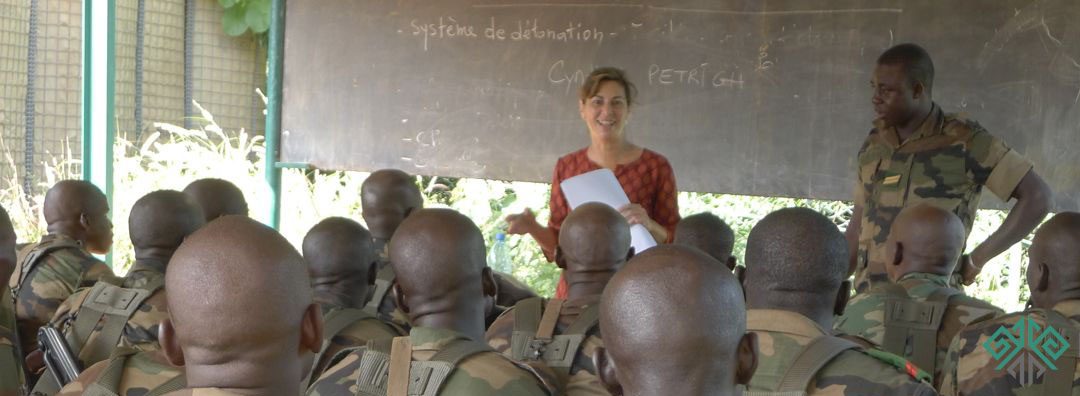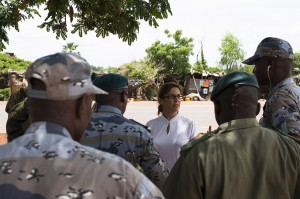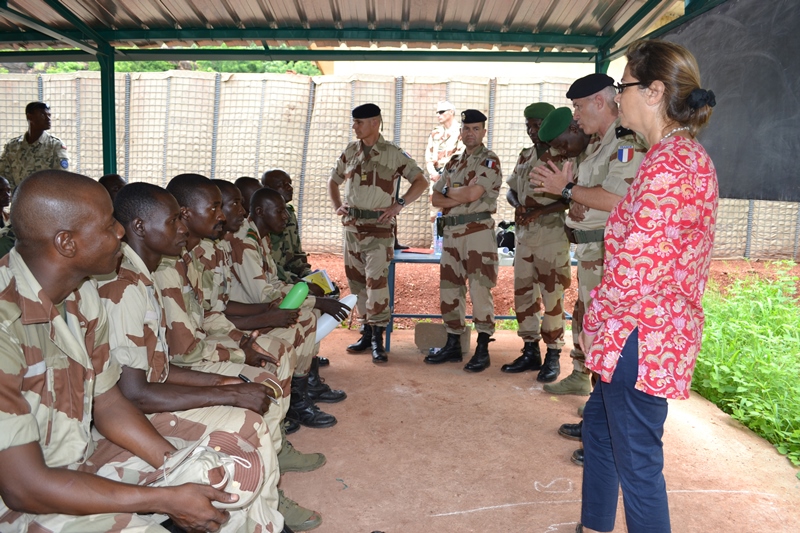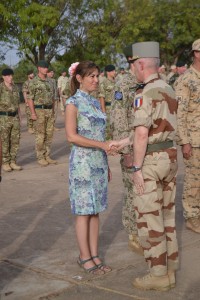
by Cynthia Petrigh | May 10, 2017 | About

No country has reached what Johann Galtung calls « positive peace ». Peace is a long-term objective for any society. A number of steps and actions can however help us move towards a higher level of justice and enjoyment of rights – with a long-term vision for an inclusive and positive peace.
For the past 5 years, the gains made in uplifting health, education, democratisation, well-being, since WWII, are reversed. After a steady increase for more than 70 years, we are witnessing an increase of violence, of contempt for a rules based world, and a slowdown in gains in life expectancy, education, equality.
We are in an unprecedented crisis of distrust, division as examples of a might based world multiply. Today more than ever, we must champion compassion, dialogue, and gender equality as fundamental drivers of positive change.
Today more than ever, we can contribute to diminishing human suffering, and to building the right environment for peaceful societies, by upholding and disseminating the international norms that protect human life and human dignity.
To this effect, we provide training and advisory services to armed forces, peacekeepers and non-state armed groups on International humanitarian law (IHL), prevention of sexual violence and compliance with international norms. In order to put an end to abuse and raise awareness about rights, we provide expertise in monitoring and investigating human rights and IHL violations, gender-based violence and international crimes affecting children. We accompany societies in transition by supporting mediation efforts, dialogue initiatives and women’s participation to peace processes. We share our comparative experience and our field-based evidence in policy and advocacy events and publications.
Beyond peace Pte Ltd is a consultancy established in 2012, specialising in support to mediation efforts and peace processes and in training armed forces on compliance. Our Founder and lead consultant Cynthia Petrigh, who has herself experienced war and exile as a child, is passionate about creating environments where everyone can thrive safely and realize their full potential regardless of their background or identity. After a career as a humanitarian worker working with refugees and victims of torture (as a Head of Mission for the Danish Refugee Council, the Executive Director of Centre Nassim for the victims of torture; or the Director of the Refugee Law Course at the International Institute of Humanitarian Law in Sanremo), she dedicated her work to addressing the root causes of violence through conflict analysis, conflict resolution, and training of combatants. She shares her vast field experience with governments, NGOs and academia, through conferences, workshops, training events and publications. Based on 25 years of international experience in human rights, compliance, dialogue, peace and security, she has demonstrated that it is possible to build trust and foster meaningful and inclusive dialogue across diverse stakeholder groups. The methodology includes tailored assessments, grounding peace in local cultures, transforming analytical insights into practical training and development programmes, and making decisive, pragmatic choices that create value for all parties involved. iN practice, we thoughtfully challenge the status quo while remaining solutions-focused.
Memberships include:
The San remo International Institute on Humanitarian Law
The UK Government’s PSVI ToE
Nepal’s Institute for International Cooperation and Engagement
The Harvard Group of Professionals on Monitoring, Fact-Finding and Reporting
The Global South Coalition for Dignified menstruation
United Against Inhumanity
Clients include: the UN (Office for Disarmament, PBSO, UNDP, Political and peacekeeping missions), the EU, the UK government, The US Africa Command, the ICRC, international NGOs.
Beyond peace works on our own projects and accepts short-term and long-term consultancies with governments, the UN, the EU, academia and NGOs. For inquiries on working with Beyond peace, contact us: Cynthia.petrigh@gmail.com

by Cynthia Petrigh | Mar 28, 2014 | About
On March 1st, Cynthia Petrigh was awarded the Common Security and Defense Policy medal by head of the European Union training mission in Mali (EUTM) General Guibert, to congratulate her for the good work achieved in Mali.
 “On behalf of Catherine Ashton, I am awarding you this beautiful and well deserved medal”, said General Guibert. Cynthia is deployed in Mali on behalf of UK Stabilisation Unit since June 2013, to train the Malian armed forces in IHL and human rights as part of the EUTM mission. The mission counts 560 members from 23 European nations, including 190 trainers, all military apart from her.
“On behalf of Catherine Ashton, I am awarding you this beautiful and well deserved medal”, said General Guibert. Cynthia is deployed in Mali on behalf of UK Stabilisation Unit since June 2013, to train the Malian armed forces in IHL and human rights as part of the EUTM mission. The mission counts 560 members from 23 European nations, including 190 trainers, all military apart from her.

by Espen Pettersen | Oct 15, 2013 | About
Member since:
January 2012
Interview conducted on:
25 July 2013
“In my work, I wanted to directly contribute to improving people’s lives, but also to influence policy on a larger scale to help solve the overarching problems,” says Cynthia Petrigh. She has managed to do both. One the one hand, she has spent considerable time doing research and policy work and monitoring respect for international human rights law (IHRL) and international humanitarian law (IHL). On the other, she has worked directly with refugees and torture victims and carried out training with armed groups on IHL and IHRL in different parts of the world. In order to be able to maintain this mix of policy-related work with more direct implementation and be able to focus on the projects where she can have the maximum impact, Cynthia recently founded her own company, Beyond (peace). After having been contracted by various NGOs, governments, and intergovernmental organizations, this has most recently taken her to Mali, where she is the only civilian member of a military mission conducting training for the Malian armed forces. Her role is to lead courses and drills designed to improve the soldiers’ knowledge of IHL, IHRL, and gender-based and sexual violence, and help ensure that it is reflected in their actions. Working with Malian soldiers, Cynthia is faced with challenging questions on a daily basis. “These are people who have seen some of their comrades killed right in front of them, sometimes in very inhumane ways,” she explains. “They challenge me: why should I respect international law when my enemy clearly does not?” Helping her students to make sense of why there are limits to what is allowed in war has been an instructive experience for herself as well. “This reminds us of why it is so important to respect these rules,” she says. “You can look at it as a very pragmatic project addressing a specific issue, but it should also improve the lives of civilians in the long term through better respect of international law in the future”.
“ Understanding the needs of particular missions is clearly crucial for policy and funding decisions while at headquarters, but so is understanding how decisions are made at headquarters when working in the field – Cynthia Petrigh ”
Global developments in the means and methods of warfare pose additional challenges to her work in Mali. Cynthia highlights in particular how IHL definitions and concepts are increasingly blurred by the emergence of new technologies, such as the use of drones. Even when carrying out training on international law, this has concrete implications: “How can I explain to a Malian soldier why he should respect IHL when international actors are in practice undermining the distinction between combatant and non-combatant?” Moving between headquarters and field-based positions has given her a chance to understand both perspectives: “Understanding the needs of particular missions is clearly crucial for policy and funding decisions while at headquarters, but so is understanding how decisions are made at headquarters when working in the field.” But she has also found it useful to take a step back and analyze her work and experiences from a more theoretical perspective. This is why she decided in 2006 to take a year off from her work as Country Director for the Danish Refugee Council in Lebanon in order to follow the Master Program in Conflict Resolution at Bradford University, something she would recommend to anyone who has the possibility to do so On a personal level, Cynthia considers the re-entry problem to be a major challenge for humanitarian professionals working in the field. Returning home after a mission abroad often leads to a sense of disconnect: “Your friends and family struggle with understanding what you’ve been doing and why it’s so important to you. At the same time, you don’t understand why it’s so important that the price of a metro ticket went up by 30 cents.” But some of the most important challenges faced by humanitarian field workers are while they are still on mission. There are considerable psychological and emotional difficulties associated with constantly travelling and working in challenging environments, and Cynthia finds that these are often not given sufficient attention. “Many employers don’t invest enough in the well-being of their workers, while security is often overemphasized. After 9/11, we drive around in armored cars and wear body armor, but what will really make you feel safe is to have place where you feel comfortable and to have emotional support,” she says. Having been both a participant and speaker at PHAP training events, Cynthia finds it useful to combine those two roles. “Even if I contribute as a trainer on one course, I will still benefit from being a participant on another – there are always fields where there are new challenges or where a colleague has discovered a new approach, and PHAP manages to hit the right balance between discussing theory and sharing practical experience between peers,” she says. “On top of the knowledge-based content, I have access to a community of practitioners for feedback, discussions, and sharing experiences – and this often provides great ideas for new course content in a way that follows recent developments very closely!” You can meet Cynthia in Istanbul and Geneva this fall, where she will be a speaker in PHAP’s Advanced Training on Humanitarian Law and Policy.






